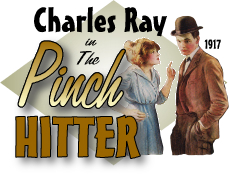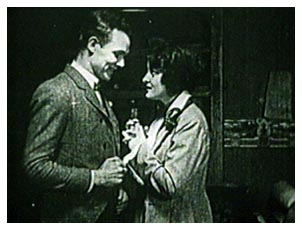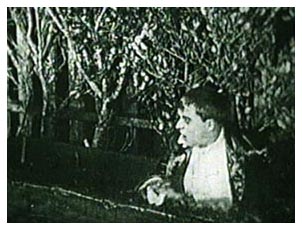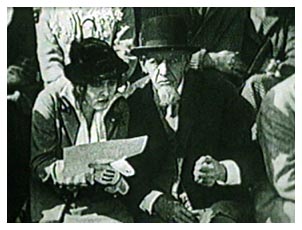

Triangle-Ince-Kaybee
Cast: Charles Ray (Joel Parker), Sylvia Bremer (sic) (Abbie Nettleton),
J.J. Dowling (Obediah Parker), Jerome Storm (Jimmie Slater), Darrel
Fors (Alexis Thompson), Louis Durham (Coach Nolan)
Joel Parker lives with his father on a farm in Turkey Creek, Vermont. He is a backward, shy farm boy who is constantly demeaned by his father's predictions that he will never amount to anything. Only because it was his mother's dying wish, the father sends Joel to college in Williamson. There he is the butt of everyone's jokes - except for Abbie Nettleton who works in a cream puff shop in the little town. He endures all sorts of hurtful pranks, and eventually decides, with Abbie's faith in him, that he should try out for the baseball team. He is such an inept "boob" that the coach decides to keep him on as mascot for good luck. Joel thinks he's a member of the team and proudly sends a photo of himself in uniform to his father. On the day of the big game, his father shows up, and he and Abbie sit in the stands waiting to see Joel finally succeed at something. His chance comes in the bottom of the ninth inning with his team one run behind, and the coach has used up all of his players except one - Joel.
Charles Ray epitomized the bashful country boy who, in spite of his lack of belief in himself, still succeeds in the end. As Kalton C. Lahue described him in Gentlemen to the Rescue (A.S Barnes and Co., Inc., 1972), "Ray projected more like the apologetic youngster who tried his best to overcome adversity and fate with nothing more than good deeds and intentions. People pushed him around without much effort until grit and determination finally rose up to strike down his detractors like vengeful lightning in the final reel."
Admittedly, it is this general theme that seems to flow
through all of Ray's films from the late 'teens, however, his
films aren't as formulaic as we would be led  to
believe. Regardless of how many Charles Ray films we may see,
each one retains its own unique charm and these simple, somewhat
"cornball," stories grab the viewer's undivided attention
in anticipation of the means by which the boy will eventually
triumph. Actually, the same could be said for many of Harold Lloyd's
comedies. Three, in particular, come to mind in which he played
"country bumpkins" - "Grandma's Boy" (1921)
"Girl Shy" (1924) and "The Kid Brother" (1927).
Just as in the Ray pictures, a seemingly inept milquetoast realizes
an inner strength or resourcefulness that comes to the fore just
at the moment it is most needed and vanquishes whatever or whoever
is impeding his success. After Willie Work and Lonesome Luke,
Lloyd was looking for a character to portray and gave credit for
his glasses character to a film with a bespectacled parson who
rose to the occasion when needed. Ray's films were at their height
of popularity when Lloyd was undergoing this transformation, so
it would not be a stretch to assume he was influenced - either
consciously or subconsciously - by Ray's screen persona. Actually,
after watching "The Pinch Hitter," the viewer will see
many similarities to Lloyd's "The Freshman" (1925) which
hit the screens eight years later.
to
believe. Regardless of how many Charles Ray films we may see,
each one retains its own unique charm and these simple, somewhat
"cornball," stories grab the viewer's undivided attention
in anticipation of the means by which the boy will eventually
triumph. Actually, the same could be said for many of Harold Lloyd's
comedies. Three, in particular, come to mind in which he played
"country bumpkins" - "Grandma's Boy" (1921)
"Girl Shy" (1924) and "The Kid Brother" (1927).
Just as in the Ray pictures, a seemingly inept milquetoast realizes
an inner strength or resourcefulness that comes to the fore just
at the moment it is most needed and vanquishes whatever or whoever
is impeding his success. After Willie Work and Lonesome Luke,
Lloyd was looking for a character to portray and gave credit for
his glasses character to a film with a bespectacled parson who
rose to the occasion when needed. Ray's films were at their height
of popularity when Lloyd was undergoing this transformation, so
it would not be a stretch to assume he was influenced - either
consciously or subconsciously - by Ray's screen persona. Actually,
after watching "The Pinch Hitter," the viewer will see
many similarities to Lloyd's "The Freshman" (1925) which
hit the screens eight years later.
DeWitt Bodeen observed in More From Hollywood (A.S. Barnes and Co., Inc., 1977), " . . . there was a loving humour in the way he (Ray) portrayed American youth on the screen, and, often, real wit. Whereas Harold Lloyd made the bashful, backward American boy amusing, Ray made him real. It's true, perhaps, that Richard Barthelmess made the American youth a deeper character (Tol'able David, Way Down East, The Bond Boy). But Ray made him more simpatico."
"The Pinch Hitter" is an excellent example of how a Ray film engages the viewer with a combination of pathos, love interest, a strong characterization, and a riveting finale. He is introduced as "Obediah's only son. Orful bashful and sorta dummified. He don't take no interest in plowin' nor nothin' worth a man's while." Not a description of an individual with much promise, but a later intertitle indicates there may be a deeper reason for the make-up of this young boy as we are told that his father considers him worthless and "headed for brimstone." "You don't know nothin'; ye ain't nothin', and ye ain't never going to be nothin'!" his father tells him - words that would certainly wash away a young boy's self-esteem. Further, we are told that he has "struggled since childhood against his father's prophecy that he's bound to be no good." A psychology class would have a "field day" with this film!
However, just as the story has us in its pitiable grip, a light shines through in an opportunity for Joel to go to college. His father continues to reiterate his lack of faith in the boy pronouncing, "Won't do you any good," but the father has made a death-bed promise to the boy's mother that he would send him to college, and he reluctantly follows through with it.
At college, we continue to see only hopelessness in the boy - at least in social situations. "The Pinch Hitter" never shows us a classroom setting or gives any indication of Joe's success - or lack thereof - in his studies. We can only assume he is doing acceptable work since he is continues to remain at the school. Of course, in the movies, college coursework fails miserably to elicit the level of interest that "college life" evokes.
What makes more interesting material for this film is the group of college pranksters, led by the melodramatic Jimmie Slater, who take him on constantly and unrelentingly as the recipient of their heartless horseplay. One of their cruelest jokes comes after the penniless Joel has found a quarter on the ground. His father arranged to have his meals and room paid for refusing to send the boy any money whatsoever. So, when he found the quarter, he was excited at the opportunity to finally take Abbie out for a soda. To Joel's and Abbie's dismay, the other boys follow, seating themselves all around the solitude seeking couple and ordering sodas. When they finally leave, they tell the owner that Joel is treating and then go outside to watch through the window at the results of their prank.
Joel, embarrassed and too shy to stand up to the boys, fidgets
and feels around in his pockets for money that he knows isn't
there. Abbie, painfully aware of the  dilemma,
distracts him for a moment and then slips a coin in his pocket.
In desperation, Joel continues to feel in each pocket of is pants
and vest and finally - to his great relief - discovers the coin
Abbie has placed in his pocket. Although he has no idea where
the money came from, he is much relieved to now have enough to
pay the entire bill.
dilemma,
distracts him for a moment and then slips a coin in his pocket.
In desperation, Joel continues to feel in each pocket of is pants
and vest and finally - to his great relief - discovers the coin
Abbie has placed in his pocket. Although he has no idea where
the money came from, he is much relieved to now have enough to
pay the entire bill.
We are to soon learn that the boys do have some redeeming qualities and are not simply portrayed as villains in the story. This happens when the first "hop" of the season takes place.
Joel escorts Abbie to the dance, and, as they walk in, Alexis Thompson, an upperclassman, looking very haughty in his tux, sneers, "Don't you know any better than to bring a waitress to one of our dances?" Abbie overhears this comment, and, although we don't have any intertitles to let us know what is said, it appears Joel is pleading with Thompson rather than defending his date. When Abbie sees this, she angrily tells Joel not to speak to her or even think of her as she bounds out the door. When Slater finds out what happened, he and several of the other boys take Thompson to a water trough outside Abbie's window and dunk him under the water. Thompson emerges, tux dripping wet, shaking his fist at the boys. After all of the cruelty jokes they have played on Joel, this act mellows the viewer's attitude toward the mischievous boys.
However, this event has only served to solidify Joel's low opinion of himself. The next morning, unable to accept the fact that he has failed Abbie, he decides to leave. As he sneaks away down the street, suitcase in hand, Abbie spots him and drags him into her store. "You're a fraidy-cat and a cry baby," she tells him. "The worst thing in the world is a quitter!" Joel's anger and resolve to show her he's not a quitter is just the response she hoped to elicit - and he decides to stay.
Although "The Pinch Hitter" indicates that this is a baseball movie, a full 28 minutes - over half the movie's 48-minute length - elapses before we see the first sign of anything related to the game. Although the title is very appropriate, the movie - as it should - spends more time on the development of character, which brings a real purpose to the baseball sequence and deeper meaning to his ultimate success than just winning a ballgame.
As Joel tries out for the team, we see very quickly that he is incapable of catching a ball, and his lack of skill only encourages the other boys' taunting of Joel. Although we are somewhat heartened by one of Joel's comments that he once hit a ball over old man Tussler's barn, he is not given the opportunity to show his skill with a bat - at least not until the right moment! So, because of his ineptitude, the coach decides to keep the "boob" on as a mascot for good luck. Joel, thinking he has been selected for the team, proudly has a photo made in uniform giving one to Abbie and sending another to his father.
The ending of the movie is, as expected, very predictable,
but this type of ending has been appealing to moviegoers for the
past 100 years in every type of sport  from
hockey to football and sports car racing to basketball. It's the
big game for the championship - it's the bottom of the ninth inning
and Joel's team is one run behind - there are two outs and a man
on third base - their star hitter is injured and can't bat - all
of the pinch hitters have been used up - there is only one possible
player left that the coach can use! Need we say more? (Does this
sound somewhat like the ending of Lloyd's" The Freshman"?)
from
hockey to football and sports car racing to basketball. It's the
big game for the championship - it's the bottom of the ninth inning
and Joel's team is one run behind - there are two outs and a man
on third base - their star hitter is injured and can't bat - all
of the pinch hitters have been used up - there is only one possible
player left that the coach can use! Need we say more? (Does this
sound somewhat like the ending of Lloyd's" The Freshman"?)
The film was expertly directed by Victor Schertzinger, who, according to Bodeen, was "probably Hollywood's best-liked director of all time." He was certainly one of Ray's favorites directing him in 13 of his films between 1917 and 1919. Of Schertzinger, Ray said, "Just before doing a certain episode I may re-read it and talk it over with Vic . . . I can't explain how it is between Vic and me - we so thoroughly understand each other we don't have to talk when he directs. He looks at me; I look at him. It must be thought-transference or something, but I feel harmonious when he is around."
As with all of Ray's films from this period, there is a visual charm along with the appeal of the story. Sets are very basic, but they also have an authentic look that invites the viewer into a pastoral setting that has possibly disappeared from existence - stores with clapboard siding, wooden walkways instead of sidewalks, unpaved roads, ice cream parlors, a cream puff shop, the college "hop," a baseball stadium with wooden seats and "chicken wire" fences, and more. Whereas other films may opt for a "gritty realism" that shows the seamier side of life, Ray's film also gave us realism, but one that we see, smile, and feel nostalgic about.
Kino (www.kino.com) recently released a DVD set with Ray's follow-up baseball feature "The Busher" (1919) and Babe Ruth's "Headin' Home" (1920) which also includes 11 baseball-related shorts. "The Pinch Hitter" can be obtained from Grapevine Video (www.grapevinevideo.com) on a double feature DVD with "The Busher." However, there is no "either, or" decision to make here. Both DVD's are a must for the silent film collector. "The Pinch Hitter" and "The Busher" are a must for the silent film collector, but so is the well packaged and beautifully presented two-disc "Reel Baseball" set from Kino. You won't want to miss any of these great films.